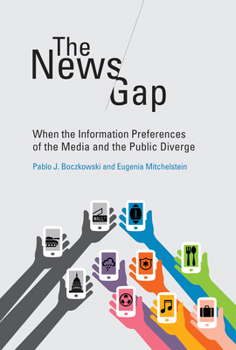The News Gap: When the Information Preferences of the Media and the Public Diverge
Select Format
Select Condition 
Book Overview
The websites of major media organizations--CNN, USA Today, the Guardian, and others--provide the public with much of the online news they consume. But although a large proportion of the top stories these sites disseminate cover politics, international relations, and economics, users of these sites show a preference (as evidenced by the most viewed stories) for news about sports, crime, entertainment, and weather. In this book, Pablo Boczkowski and Eugenia Mitchelstein examine the divergence in preferences and consider its implications for the media industry and democratic life in the digital age.
Drawing on analyses of more than 50,000 stories posted on twenty news sites in seven countries in North and South America and Western Europe, Boczkowski and Mitchelstein find that the gap in news preferences exists regardless of ideological orientation or national media culture, and that it is not affected by innovations in forms of storytelling, such as blogs and user-generated content on mainstream news sites. Drawing upon these findings, they explore the news gap's troubling consequences for the matrix that connects communication, technology, and politics in the digital age.





